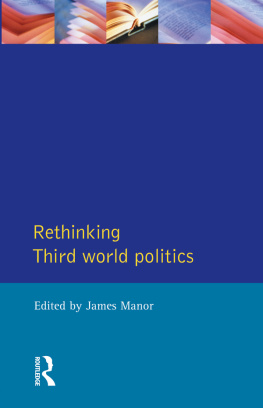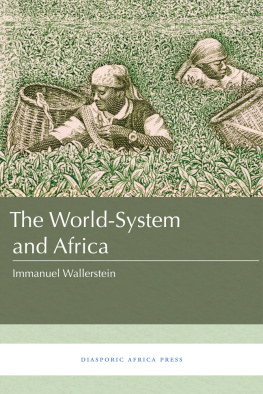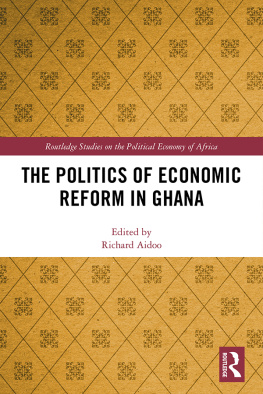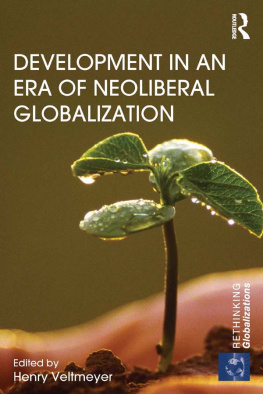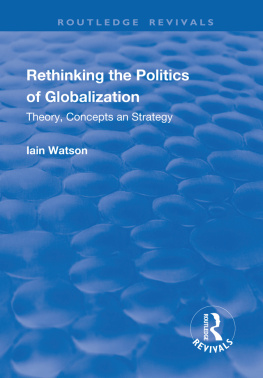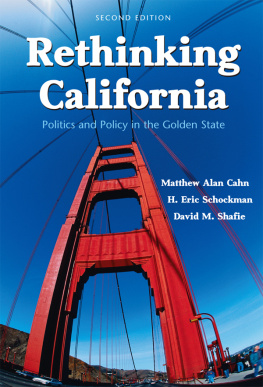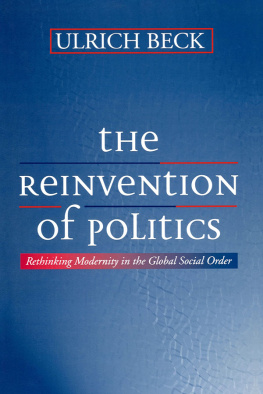RETHINKING THIRD WORLD POLITICS
RETHINKING THIRD WORLD POLITICS
edited by James Manor

First published 1991 by Longman Group Limited
Second impression 1992
Published 2013 by Routledge
2 Park Square, Milton Park, Abingdon, Oxon OX14 4RN
711 Third Avenue, New York, NY 10017, USA
Routledge is an imprint of the Taylor & Francis Group, an informa business
Copyright 1991, Taylor & Francis.
All rights reserved. No part of this book may be reprinted or reproduced or utilised in any form or by any electronic, mechanical, or other means, now known or hereafter invented, including photocopying and recording, or in any information storage or retrieval system, without permission in writing from the publishers.
Notices
Knowledge and best practice in this field are constantly changing. As new research and experience broaden our understanding, changes in research methods, professional practices, or medical treatment may become necessary.
Practitioners and researchers must always rely on their own experience and knowledge in evaluating and using any information, methods, compounds, or experiments described herein. In using such information or methods they should be mindful of their own safety and the safety of others, including parties for whom they have a professional responsibility.
To the fullest extent of the law, neither the Publisher nor the authors, contributors, or editors, assume any liability for any injury and/or damage to persons or property as a matter of products liability, negligence or otherwise, or from any use or operation of any methods, products, instructions, or ideas contained in the material herein.
ISBN 13: 978-0-582-07458-3 (pbk)
BRITISH LIBRARY CATALOGUING IN PUBLICATION DATA
Rethinking Third World Politics.
I. Manor, James
320.9171
LIBRARY OF CONGRESS CATALOGING IN PUBLICATION DATA
Rethinking Third World Politics / edited by James Manor.
p. cm.
Papers presented at a conference held in Berlin, mid-1989, sponsored by the German Foundation for International Development.
Includes bibliographical references and index.
ISBN 0-582-07459-2 ISBN 0-582-07458-4
1. Developing countries Politics and government. I. Manor, James. II. Deutsche Stiftung fr Internationale Entwicklung.
JF 60.R45 1991
320.91724 dc20 | 91-11336 |
CIP |
Set in Linotron 202 10/12 Bembo
Contents
James Manor
Chai-Anan Samudavanija
Geoffrey Hawthorn
Jean-Franois Bayart
Sudipta Kaviraj
Manuel Antonio Garreton
Rudolf Wagner
Donal B. Cruise OBrien
Achille Mbembe
Jean-Franois Medard
Richard Crook
Christopher Clapham
Eberhard Sandschneider
The editor and contributors to this book owe an immense debt to the German Foundation for International Development, whose generous support was essential to the success of this project. The Foundation brought contributors from Asia, Africa, Latin America and Europe to the Villa Borsig in Berlin for a week in mid-1989. The facilities, hospitality and staff support in Berlin were superb. The provision of simultaneous translation facilities was particularly important since it enabled us to engage in much more detailed and sophisticated discussions than would otherwise have been possible.
The Foundation has also made it possible for us to make this book available to readers in the Third World at an affordable price. Our special thanks go to Dr Henner Papendieck, the programme officer for this project, to Mrs Christine Schultze and other members of the staff in Berlin, and to Professor Hans-R. Hemmer, Director-General of the Foundation.
We are also grateful to the Noel Buxton Trust and the British Council, which assisted in mounting a series of exploratory seminars in London involving German, French and British scholars during the year prior to the Berlin conference. The School of Oriental and African Studies, University of London, and the Institute of Development Studies, University of Sussex, also provided support for these seminars, which were jointly chaired by the editor and Donal B. Cruise OBrien.
Thanks are also due to Mary Harper for translating the chapters by Jean-Franois Bayart and Achille Mbembe from the French, to Dr Christopher Harrison and Pat Root at Longman, and to Marguerite Cooke for vigilant assistance in preparing the manuscript for publication.
J.M.
Brighton, 1990
Jean-Franois Bayart, Centre dEtudes et de Recherches Internationales, Fondation Nationale des Sciences Politiques, Paris
Chai-Anan Samudavanija, Faculty of Political Science, Chulalong-korn University, Bangkok
Christopher Clapham, Department of Politics and International Relations, University of Lancaster
Richard Crook, Department of Politics, University of Glasgow
Donal B. Cruise OBrien, Department of Political Studies, School of Oriental and African Studies, University of London
Manuel Antonio Garreton, Facultad Latinamericano de Ciencias Sociales, Santiago
Geoffrey Hawthorn, Faculty of Social and Political Sciences, University of Cambridge
Sudipta Kaviraj, Centre for Political Studies, Jawaharlal Nehru University, New Delhi
James Manor, Institute of Development Studies, University of Sussex
Achille Mbembe, Department of History, Columbia University, New York
Jean-Franois Medard, Centre dEtude dAfrique Noire, Universit de Bordeaux I
Eberhard Sandschneider, Arbeitsstelle Politik Chinas und Ostasiens, Universitt des Saarlandes, Saarbrucken
Rudolf Wagner, Sinologisches Institut, Universitt Heidelberg
For Rajni Kothar
and Benjamin I. Schwartz
James Manor
The study of Third World politics is in disarray. This is partly the result of the success of researchers who have produced an explosion of empirical work over the last twenty-five years or so. Because so much is known in so many diverse sub-fields, the task of those who would bring coherence to the field and generate broad theoretical insights has become enormously difficult. This problem affects the field of political science generally, but it is especially acute for those seeking to draw together studies of Asia, Africa and Latin America since the cultural and other complexities that arise are so daunting.
Scholarly over-achievement is not, however, the only reason for the disarray. It is more adequately explained by the severe difficulties encountered by the two paradigms or schools of thought which have dominated the study of Third World politics in recent memory.
The first of these the political development school yielded plenty of important insights, but it tended to misperceive both present and past realities and future possibilities. It tended, for example, to create models which presumed more equilibrium and fewer contradictions in societies and polities than were actually there. Its expectations that less developed nations might converge on what Geoffrey Hawthorn here describes as an even, equable and eventually self-equilibrating modernity were misplaced. It often emphasised stability at the expense of change and social justice. Many in this school made simplistic contrasts between tradition and modernity, and tended to underestimate the diversity among Third World countries, the importance of political economy within nations and of the international economic order.
Next page
